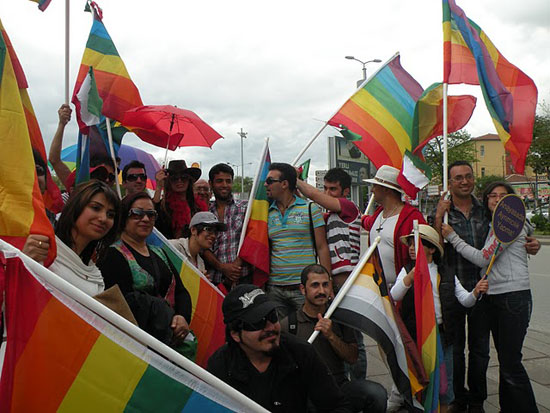Because of Islam’s many sects and a lack of centralized religious authority, there is no one opinion on the status and rights of LGBT peoples.
The International Lesbian and Gay Association (ILGA) notes that of the seven countries that currently have the death penalty for homosexuality, all are Muslim or predominantly Muslim states.
In Saudi Arabia, governed by Shari’ah law, sentencing decisions for the crime of homosexuality vary, including a 2010 sentencing of a man to 500 lashes and five years in jail for having sex with another man.
Another example is Iran, where homosexual intercourse is punishable by death for men and by lashings for women. Not all citizens of an Islamic Republic charged with the crimes of lavat (sodomy) and mosahegheh (lesbian sex acts) will face the death penalty. Whether the sex was consensual, and whether parties involved were minors or adults, is rarely if ever taken into account.
Silencing and repression in Iran
Consider the case of Hamoud Asgari and Ayaz Marhoni.
Hastily convicted and executed by hanging in a public square for the rape of a 13-year-old boy, Asgari and Marhoni were listed in court documents as being sixteen and eighteen-years old respectively — yet many international organizations in and outside of Iran vociferously condemned their execution arguing the boys were in fact younger and the sex had been consensual and not rape.
This is just one example of Iran’s history of silencing and repressing its gay population.
President Ahmadinejad’s famous claim, made while speaking to American students on a visit to New York, that “Iran [doesn’t] have homosexuals like you do in your country. This does not exist in our country” clearly illustrates the (mis)treatment of homosexuals in Iran.
And while Iranian law criminalizes all sexual relations taking place outside the marriage, sexual minorities feel the impact most strongly.
Whether or not an individual faces the death penalty, the physical and mental persecution and social isolation remains endemic. Afraid for their life and unable to endure societal and governmental persecution, religious opprobrium and familial disapproval, many gay Iranian men are being encouraged or pressured into having sex reassignment surgeries (SRS).
For these individuals, changing genders has become a way of avoiding a lifetime of fear of persecution and death.
Making SRS legal and subsidized
Prior to the Revolution of 1979 Iran had failed to address transsexuals and their status in society. Following the Revolution, transsexuals were criminalized and lumped together with gays and lesbians.
Then, in 1987, the Ayatollah Khomeini granted permission to a male to undergo SRS and to live as a woman, a fatwa which made SRS legal.
The procedure, described by one Islamic cleric as being simple as “changing wheat to flour to bread,” is justified by the Iranian government (which subsidizes some if not all the costs of surgery) on the basis that it allows gay men to classify their condition as medical instead of an unnatural “sin” going against Islamic tenets.
According to the same cleric, “the Islamic community has discovered a cure for people suffering from this problem. If they want to change their gender, the path is open.”
The 1987 fatwa, coupled with a fatwa from Islam’s oldest university in Egypt, Al-Azhar, which also made SRS a legal and acceptable practice, has resulted in many gays from other Islamic states, including Saudi Arabia, Pakistan, Egypt and Malaysia, traveling to sex-change surgery capitals like Iran and Thailand for these procedures and returning to their country where their home government will readily reissue legal documents that reflect the newly-acquired gender identity.
As one recipient of SRS puts it, “I am Iranian. I want to live here and this society tells you: you have to be either a man or a woman.”
While Iran is essentially encouraging a boom in SRS, Thailand — the original SRS capital of the world — has recently sought to clamp down on the frequency and availability of such operations by imposing a mandatory one-year wait period between the initial consult and surgery.
And even though SRS are common enough to be advertised in bold print in local newspapers in places like Iran and Thailand, Canada has seen a long — and until recently — futile rallying cry to better address the lack of funding and medical coverage for individuals in need of such procedures.
Presently, medical coverage for SRS’ vary province-to-province — some fully fund the surgery while others will partial or no funding.
Milestone for transgender and transsexual people in Canada
In 2009 NDP’s Bill Siksay put forth a private member bill Bill C-389 seeking to add gender identity and expression to the Canadian Human Rights Act. Siksay hoped this would ensure fuller protection for the rights of transgender and transsexual individuals. This bill did not become law.
But Canada reached a milestone on March 20.
The night before this article went to press the House of Commons approved a bill that made it illegal to discriminate against transgender Canadians, signaling Canada’s step away from its history of marginalization of transgender and transsexual citizens.
But for those who turn to SRS as a way out — a means to an end — the future is less clear.
While a beneficial surgery for many who seek it, according to a 2003 Swedish study sex-reassigned persons face a considerably higher risk of suicide and psychiatric morbidity than the general population.
And despite Iran’s perversely innovative ‘solution’ to its ‘gay problem,’ the long-term effects of such procedures — especially when coerced — remain unclear. It may very well be that in endeavoring to ‘cure’ itself of one crisis the Islamic Republic of Iran has created another.
Maria Kari is a writer and law student from Vancouver, B.C. Follow her on Twitter: @mariakari1414.



